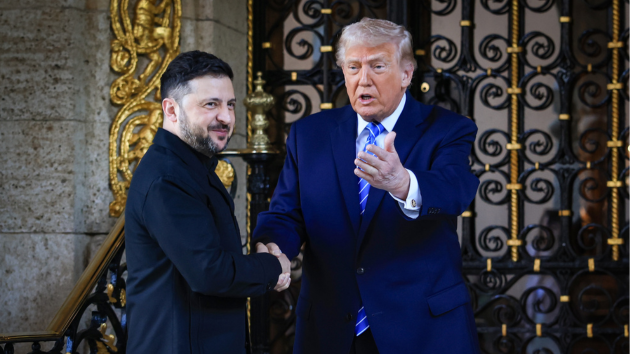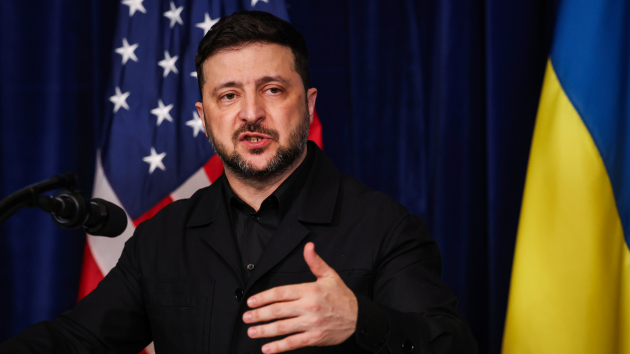Gaza aid piles up amid dispute over whether aid workers can carry radios, security gear
Written by ABC Audio ALL RIGHTS RESERVED on June 28, 2024

(NEW YORK) — U.S. aid intended to help desperate Gaza residents has been sitting untouched on a beach in the war-torn strip because of a long-running dispute between the U.N. and Israel over whether the aid workers in charge of distributing the supplies can carry protective gear, radios and other sensitive equipment, according to several officials familiar with the situation and documentation obtained by ABC News.
Israel, which closely screens any goods coming into Gaza, has blocked the aid workers from bringing in sophisticated protective equipment in large part because of concerns that the gear could wind up with Hamas.
The dispute reached a fever pitch this week after U.N. officials threatened to suspend humanitarian aid operations across Gaza unless their demands for security equipment was met, prompting high-level private meetings in Washington this week between the U.N. and Israeli Defense Minister Yoav Gallant, who had traveled to the U.S. for face-to-face meetings at the Pentagon and White House.
The U.N. needs “an effective and reliable set up security protocols and equipment, to help manage this risk across the [Gaza] Strip,” wrote Muhannad Hadi, a top official at the U.N., told the Israel Defense Forces in a June 17 letter.
An Israeli defense official said Gallant is personally pushing to resolve the issue and get humanitarian aid moving again. In a statement, Gallant said the dialogue is ongoing “to further address the needs on the ground, and see what can be improved.”
“As I have emphasized since the beginning of the war — our war is with Hamas, not the civilian population of Gaza,” Gallant said in a statement. “My policy, as Minister of Defense, is that of full commitment to the humanitarian efforts, and of full cooperation with the international community to improve the situation in the Gaza strip and specifically the Mawasi [a town on the southern coast of Gaza] and the rest of the humanitarian zone.”
The disagreement between the U.N. and Israel has deeply complicated extensive efforts by the U.S. to bring humanitarian aid into Gaza — a priority for President Joe Biden as he faces sharp criticism from his party for giving broad support to Israel’s military operations in Gaza since the Oct. 7 Hamas attacks.
Biden ordered the U.S. military to build a pier this spring in the hopes that an established maritime corridor could help rush in humanitarian goods and supplement aid entering through ground crossings. The pier, though, has struggled to make a substantive impact on the worsening hunger crisis, as high seas have forced it to shut down several times in the six weeks it’s been operational.
The Pentagon announced Friday the pier was being taken offline again Friday, as discussions were under way on whether to reinstall it at all.
A more pressing issue though than the pier’s operational capacity so far has been distribution. Much of the 19 million pounds of aid already delivered via the pier has been piling up after the U.N.’s World Food Programme — the sole organization tapped to distribute the aid — temporarily halted distribution after a June 8 hostage rescue operation by Israeli troops that came dangerously close to the pier.
One official, speaking on condition of anonymity, said the World Food Programme has agreed to move the current backlog of aid piled up at the beach as negotiations on the security gear continues with Israel.
In the June 17 letter obtained by ABC News, the U.N.’s Hadi said the aid organization needed specific items before it would feel comfortable resuming aid, including a “functioning mechanism for operational coordination with the IDF” that would enable “direct contact” between aid workers and IDF brigades.
The letter also called for aid workers to be allowed to bring in armored vehicles, spare parts, 100 sets of personal protective equipment and sophisticated communications equipment including satellite internet terminals and electronic SIM cards so workers could connect to a private 4G mobile network.
“Access to this equipment will be strictly limited to individuals who are actively employed by United National/International Organizations operating in Gaza. Stringent security measures will be put in place to protect the system from any potential inappropriate use and to ensure compliance with the approving authorities,” Hadi wrote to Israel’s Maj. Gen. Ghassan Alian, who attended the meetings in Washington this week with U.N officials to discuss the matter.
Several U.S. officials said they view the requests as reasonable and support Israel allowing those items inside Gaza.
The U.N. declined to comment on the specifics in the letter, which had not been publicly released.
Stéphane Dujarric, spokesperson for the Secretary-General of the United Nations, said security conditions in Gaza is part of an “ongoing discussion” with Israel.
“We’re just trying to have the basic tools to allow us to run an operation in a war zone,” he told ABC News.
ABC News’ Luis Martinez, Jordana Miller and Dana Savir contributed to this report.
Copyright © 2024, ABC Audio. All rights reserved.
 KVSP
KVSP 




